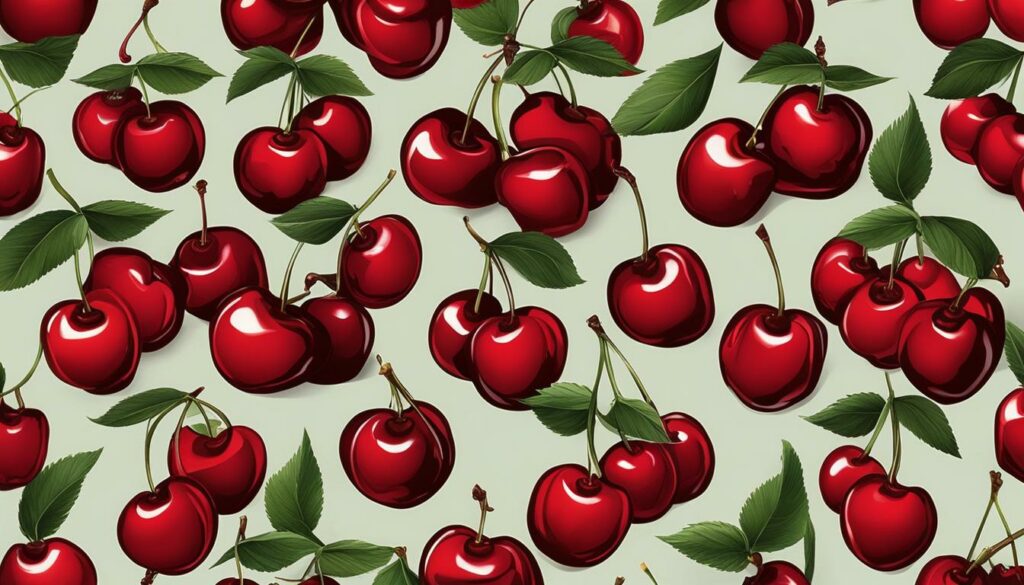Cherries, with their smooth fruit and sweet flavor, have long enjoyed a romantic reputation as an aphrodisiac. But are cherries truly the key to unlocking passion and desire? Let’s explore the benefits and properties of cherries to determine their potential aphrodisiac effects.
Key Takeaways:
- Cherries are a delicious and nutritious fruit that are high in potassium, vitamins, and antioxidants.
- They contain phytonutrients like perillyl alcohol and anthocyanin, which have shown potential in fighting cancer and reducing pain and inflammation.
- While cherries have a romantic reputation, there is limited scientific research to support their aphrodisiac effects.
- Cherries’ sensual appeal lies in their taste and enticing aroma, making them popular in aphrodisiac-inspired recipes and products.
- Other foods like watermelon, pumpkin seeds, and leafy greens have also been associated with aphrodisiac properties.
The Research Behind Cherry Aphrodisiac Effects
While cherries have a romantic reputation, the scientific research on their aphrodisiac effects is limited. There is no concrete evidence to support the claim that cherries directly enhance sexual desire.
However, certain compounds found in cherries, such as anthocyanins and antioxidants, have been studied for their potential health benefits.
These compounds can help improve overall well-being, which may indirectly contribute to a healthy sex life. It is important to note that the idea of certain foods having aphrodisiac effects is often based on folklore and cultural beliefs rather than scientific evidence.
The best approach to enhancing sexual desire is to maintain a healthy lifestyle and cultivate a positive emotional and physical connection with your partner.
The Sensual Appeal of Cherries
Cherries have a sensual appeal that goes beyond their potential aphrodisiac effects. The taste and smell of cherries can evoke a sense of pleasure and indulgence, making them an enticing addition to romantic settings.
Cherries are often used in recipes and products marketed as aphrodisiacs due to their popularity and tantalizing scent and flavor. However, the allure of cherries lies not only in their sensory appeal, but also in their true health benefits.
The fruit is rich in nutrients like potassium, vitamins, and antioxidants, which can support overall health and well-being.
So, while the sensual nature of cherries may contribute to their reputation as an aphrodisiac, their true appeal lies in their taste and nutritional value. Cherries can be enjoyed in various forms, from fresh to dried or even as a component in decadent desserts and cocktails.
Their versatility and enticing qualities make cherries a delightful addition to any intimate and romantic experience.
To fully understand the sensual appeal of cherries, it’s important to explore the cherry aphrodisiac properties explained in more detail:
The Taste and Smell of Cherries
The sweet and tart taste of cherries, combined with their alluring aroma, can create a sensory experience that stimulates the senses. Whether enjoyed on their own or as part of a romantic meal, cherries can enhance the overall sensory pleasure of the dining experience.
The Psychological Association of Cherries with Romance
“Romance is the glamour which turns the dust of everyday life into a golden haze.” – Elinor Glyn
Cherries have long been associated with love and romance in various cultures. Their red color is often linked to passion and desire. This psychological association of cherries with romance can contribute to their sensual appeal and the perception of cherries as an aphrodisiac.
The Nutritional Benefits of Cherries
While cherries are renowned for their sensual qualities, it’s essential not to overlook the nutritional benefits they provide. Cherries are packed with essential nutrients that can support overall health and well-being. Here is a breakdown of the key nutritional properties:
| Nutrient | Benefits |
|---|---|
| Potassium | Regulates blood pressure and promotes heart health |
| Vitamins C, A, and E | Boosts the immune system and promotes healthy skin |
| Antioxidants | Protects against oxidative stress and supports cell health |
These nutritional properties contribute to overall well-being, which can indirectly enhance sexual desire and intimacy.
Cherries truly offer a delightful combination of sensual appeal and nutritional value, making them a perfect addition to a romantic experience.

Exploring Other Aphrodisiac Foods
Cherries are not the only food rumored to have aphrodisiac properties. Throughout history, various foods have been associated with enhancing romance and sexual desire. Here are some other foods that have been linked to aphrodisiac effects:
Watermelon
Watermelon contains citrulline, a compound that can relax blood vessels and potentially improve erectile function.
Pumpkin Seeds
Pumpkin seeds are high in zinc, vitamins, and minerals, which can boost mood and libido.
Beetroot and Leafy Greens
Beetroot and leafy greens can increase blood flow, promoting overall cardiovascular health which can have positive effects on sexual desire.
Cranberries
Cranberries have been known to help with urinary tract infections, which can contribute to increased comfort and confidence in intimate settings.
Oysters, Bananas, and Chocolate
Oysters, bananas, and chocolate have also been considered aphrodisiacs due to their sensual nature or alleged effects on hormones and pleasure.
It is important to remember that the impact of these foods on libido may vary from person to person, and their aphrodisiac effects are not scientifically proven. However, incorporating these foods into a balanced and enjoyable diet can contribute to overall well-being, which can indirectly enhance romantic experiences.

As with any lifestyle changes, it is recommended to consult with a healthcare professional or nutritionist for personalized advice and guidance. Exploring different foods and experimenting with their potential aphrodisiac effects can be a fun and enjoyable journey in discovering new flavors and enhancing intimate moments with your partner.
Conclusion
While cherries may not have concrete scientific evidence to support their aphrodisiac effects, they are a delicious and nutritious fruit with potential health benefits. Cherries are a significant source of potassium and contain various vitamins and antioxidants that can support overall well-being.
Whether or not cherries truly enhance sexual desire, they can certainly be enjoyed as a part of a healthy and pleasurable diet. The combination of their taste, scent, and nutritional value makes them a delightful addition to romantic settings.
However, it’s important to remember that maintaining a healthy lifestyle and fostering emotional and physical connection with your partner are key factors in creating a satisfying and fulfilling intimate experience.
So, while cherries may not have recognized aphrodisiac properties, they can still be appreciated for their taste, nutrition, and the sensory pleasure they bring. Incorporating cherries into your diet can contribute to a well-rounded and enjoyable culinary experience, and may support overall wellness.
FAQ
Are cherries considered an aphrodisiac?
The idea of cherries being an aphrodisiac is primarily based on folklore and cultural beliefs. While there is no concrete scientific evidence to support their aphrodisiac effects, cherries are still a delicious and nutritious fruit with potential health benefits.
What is the research behind cherry aphrodisiac effects?
Scientific research on the aphrodisiac effects of cherries is limited. While certain compounds found in cherries, such as anthocyanins and antioxidants, have been studied for their potential health benefits, there is no direct evidence to support the claim that they enhance sexual desire.
What is the sensual appeal of cherries?
Cherries have a sensual appeal due to their taste, smell, and texture. The sensory experience of eating cherries can evoke pleasure and indulgence, making them a popular choice in romantic settings. However, their primary appeal lies in their taste and nutritional value.
Are there other foods that are considered aphrodisiacs?
Yes, throughout history, various foods have been associated with enhancing romance and sexual desire. Some examples include watermelon, pumpkin seeds, beetroot, leafy greens, cranberries, oysters, bananas, and chocolate. However, the aphrodisiac effects of these foods are not scientifically proven and may vary from person to person.
What are the benefits of cherries, regardless of their aphrodisiac properties?
Cherries are a significant source of potassium and contain vitamins C, A, and E, as well as calcium, iron, folate, and selenium. They also contain phytonutrients that have been shown to fight cancer, reduce pain, and inflammation. Cherries can be enjoyed as a part of a healthy and pleasurable diet, contributing to overall well-being.




